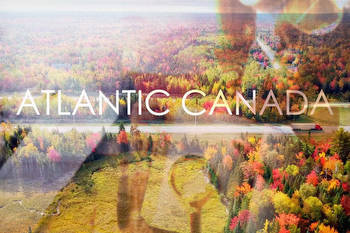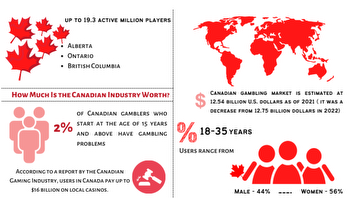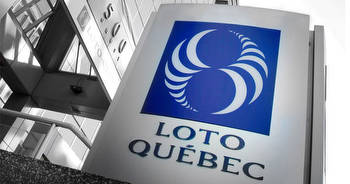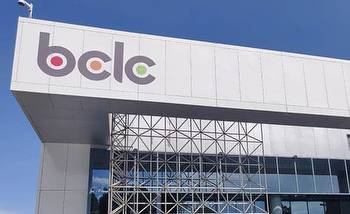Online gambling, casino profits brighten Atlantic Lottery's financial picture

The latest annual report from the Atlantic Lottery Corporation shows legal gambling to be like many other businesses in two key ways: Profits are up coming out of the pandemic, and more customers are preferring to do things online.
CEO calls lottery tickets 'an innocent indulgence' when inflation is taking a bite
The latest annual report from the Atlantic Lottery Corporation shows legal gambling to be like many other businesses in two key ways: Profits are up coming out of the pandemic and more customers prefer to do things online.
"I wouldn't categorize it as normal by any stretch," ALC president and CEO Patrick Daigle said of the 2021-22 fiscal year.
"We were still operating under some … COVID restrictions and 2023 was the first full year that we didn't have to contend with that."
Despite that, the pot of money being returned to the four Atlantic provinces took a big jump in 2021-22, with the P.E.I. government's share of net profit coming in at $23.5 million, up 59.7 per cent compared to $14.71 million the previous year.
Nova Scotia's share rose 17.8 per cent to $140.17 million, New Brunswick earned a 17.5 per cent jump to $139.3 million, and Newfoundland and Labrador took in $135.15 million, 43.2 per cent higher than the year before.
That happened as COVID restrictions eased, allowing in-person gambling to resume at video lottery terminals and places like the Red Shores casino and race tracks in Charlottetown and Summerside.
The Red Shores location in Charlottetown did particularly well, with net revenues of $17.6 million representing a growth of $5.4 million over the previous year of full-on COVID restrictions.
"It was a very positive year for Red Shores," Daigle said. "We're just so proud of that facility. It's such a showcase."
Atlantic Lottery's i-gaming operations returned big profits, too, with a 78 per cent growth rate in one year. That division includes such things as online digital bingo, sports products like ProLine, and digital instant games.
"That's frankly no different than any other fast-moving consumer goods that have a digital offering," said Daigle. "I'm sure you shop online and it's convenient for you — and for us, that's where our players are and it's their expectation.
"And so we'll meet them where they … would like to be entertained."
No e-casino in P.E.I.'s near future
In three of the four Atlantic provinces, ALC's digital footprint includes e-casino operations as well, with Newfoundland and Labrador signing on within the last year.
Prince Edward Island alone has not struck a deal to set one up, said Daigle.
"That's really a shareholder issue to deal with," he said. "From an operator perspective, really our focus is on creating a safe and regulated environment…. Each province does make different decisions on different products."
Lotto Max sales were at an all-time high, at a time when inflation was starting to bite into people's disposable income.
"I've been in this business for a very long time and we've been unable to find a correlation either way between economic conditions and our revenues," Daigle said, when asked if people might be turning to lottery tickets as a potential solution when cash gets scarce.
"I have two minds. One is … as inflation creeps up and we're seeing Atlantic Canadians with less disposable income, this in fact is a fast-moving consumer good that is discretionary. And so I would expect to see a decline in that.
"On the other hand, lottery is in fact an innocent indulgence and it's not an expensive indulgence. And so there is an opportunity to dream, perhaps."
Big increase for ProLine
ProLine sales were also up — by 43 per cent. Daigle said people betting on sports results through that game tend to be younger and male, "but it is a product that has a fairly wide appeal as well."
'Wow': Track announcer Vance Cameron captures the excitement of the 2023 Gold Cup and Saucer race
Featured VideoNew York gelding Covered Bridge wins the $100K race in front of 25,000 spectators at the Charlottetown Driving Park at Red Shores.By contrast, harness racing revenues at Red Shores were flat. Daigle said it's considered "a mature product" with a "limited scope and audience."
But the full racing cards at Red Shores during the summer months do tend to draw people to the downtown Charlottetown restaurant and casino complex, he added.
"Another factor is just the general population increase that we've seen," Daigle said. "It's been years since we've seen population numbers like this throughout Atlantic Canada."
And though inflation hasn't been tamed, "we're still not seeing the economic slowdown in Atlantic Canada and some other areas are. So we definitely have some tailwinds helping the business."
Carolyn Ryan has spent decades writing, editing and assigning other staff as a print, radio and digital journalist. A graduate of the University of Prince Edward Island and the Carleton University School of Journalism, she is now the copy editor for CBC P.E.I.'s digital news operation.






































